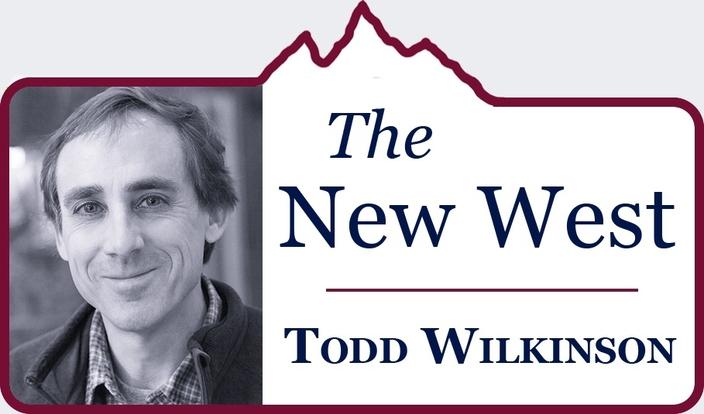Back to StoriesMaking Teddy Roosevelt Mad Not Proud: Trump and Zinke Score A Witless Triumph In Utah
December 5, 2017
Making Teddy Roosevelt Mad Not Proud: Trump and Zinke Score A Witless Triumph In UtahThe President And His Interior Secretary Demonstrate A Clueless Understanding Of Economics Driving The New West.
President Donald Trump flew into Salt Lake City this
week and announced that he was bestowing an early Christmas present upon rural
counties in southern Utah.
The gift that he and Interior Secretary Ryan Zinke
delivered was a decision, pre-ordained months ago, to undo a century’s worth of
conservation history. It came in the form of dramatically reducing the size of
Bears Ears and Grand Staircase-Escalante national monuments.
Within the span of just a few days, not only did Trump
roll back a legacy of landscape protection that started with Theodore
Roosevelt’s use of the federal Antiquities Act—a law that many forget was also
the genesis for such modern national parks (economic juggernauts) as Grand
Teton and Grand Canyon; but only hours earlier the Republican-controlled U.S.
Senate embedded an unthinkable anti-environment measure in the tax reform bill
hastily passed last week.
That legislation inexplicably includes a provision
to open the Arctic National Wildlife Refuge in Alaska—one of America’s most
pristine landscapes—to oil and gas drilling.
“Opening the Arctic to drilling as part of this tax plan is simply shameful," said David Yarnold, the president and CEO of the National Audubon Society said in a statement to National Geographic. "The Arctic refuge isn’t a bank—drilling there won’t pay for the tax cuts the Senate just passed. The American people don’t support drilling in the Arctic and it’s up to the House to reject this flawed bill.”
If Theodore Roosevelt is considered America’s
greatest conservation-minded president, are Trump and Zinke cementing their
place as leaders of the most environmentally-hostile administration ever?
Like Trump’s lack of sophistication and knowledge
with many things, he is apparently illiterate in his understanding of public
land issues in the West. His witlessness extends to his primitive grasp of
nature, the purpose of environmental laws, and his obvious lack of awareness and
respect for Native Americans.
When he described the creation of Bears Ears and
Grand Escalante as “tragic federal overreach” and included several assertions
that simply aren’t true, it revealed not merely his own cluelessness but that
of his speechwriters in grasping fundamental shifts underway in the economy of
the West.
How can there be “tragic federal overreach” when
national monument status was applied to spectacular federal lands that American
citizens already owned? Never mind that creation of Bears Ears enjoyed overwhelming support from indigenous communities who wanted the archaeological sites and the lands that give them their living context protected. Never mind that Grand Staircase-Escalante represents yet another masterpiece of natural beauty in Utah and it holds the largest concentration of slot canyons in the country.
Trump’s penchant for needlessly sowing melodrama and divisiveness reminds me of
a cover story I wrote for The Christian Science Monitor on the differences
emerging between the boom and bust cycles that plagued traditional natural
resource economies in the “Old West” and undeniable trends in the “New West.”
In 2011, a Congressional hearing was
held in Washington on the value of protected federal lands. Ray Rasker, founder
of Bozeman-based Headwaters Economics, went to Capitol Hill to deliver his
findings that resource protection continues to fuel a different kind of economic
prosperity.
(Check out Headwaters’ “Economic Profile System”, using official
U.S. Census Bureau information, that allows readers to glean an in-depth look at
the economics of every county in the country. Also check out Headwaters' analysis, "The Economic Importance of National Monuments To Communities" using information from federal and state agencies).
During the hearing, Rasker squared
off against Jerry Taylor, then mayor of tiny Escalante, Utah, a town that has
long been a symbol of anti-environmental, anti-federal sentiment in the West.
Escalante is considered a gateway to Grand
Staircase-Escalante National Monument that 15 years earlier had been created by
President Clinton invoking his power, as Roosevelt had done, through the
federal Antiquities Act.
Contrary to myth, the land was
already federally owned and managed by the Bureau of Land Management. Essentially,
however, monument status barred coal mining and intensive oil and gas
development, which left many locals enraged.
Taylor testified that the prosperity
mentioned by Rasker never materialized in his community. But when Taylor
returned home he heard from some constituents who had started businesses
catering to growing numbers of tourists and backcountry adventurers. The town
of Kanab (Kane County), up the highway, is representative of a community,
immersed in a healthy natural environment, that is attracting both visitors and people
wanting to retire or resettle there.
U.S. Rep. Rob Bishop (R-Utah), Trump, Zinke and others claim
the national monument brought economic hardship to Escalante (Garfield County),
though the remote rural county, like many in the West, has been losing
population for generations. Some members of the Utah media, too, have
falsely portrayed the monument as a federal land grab.
Two years after Taylor went to
Washington, he and I had a couple of thoughtful conversations. His community
was desperate. School enrollment was dropping. He didn’t care what kind of job
creation happened. Ironically, he noted that several young people from
Escalante left town to find short-term work as roughnecks in the energy fields
of Wyoming and the Bakken in North Dakota.
"This is a beautiful place, and
I understand why they [the Clinton administration] made it into a monument. But
as far as jobs go, our numbers are down. I wish we had jobs that could bring
those young men home," Taylor said. "The state of the economy is
really a touchy topic. We're having to depend upon tourism to get us through
where we need to be."
Southern Utah is a region in
transition; natural resource extraction is not a pathway to achieving a
reliable, sustainable future for young people seeking to find a place in the 21st
century.
Yes, talk of the “amenity economy”—the
notion that spectacular landscapes pay dividends over time—may meet with
incredulity from Sagebrush Rebels stuck in the past.
Jonathan Schechter, a demographer in
Jackson Hole who makes his living analyzing the West, is known in the Rockies
for coining this maxim: "Economies change faster than perceptions,
perceptions change faster than politics, and politics change faster than
laws."
Laws that bolster conservation, however, have time and again proved their worth in being valuable to society in innumerable ways, accruing value that has grown across generations.
Still, the tension between the New and Old
Economies undergirds almost every preservation and public land-use issue in the
West. Speaking in uninformed platitudes, as Trump and Zinke do, denying climate
change, treating the West as a 19th-century extractive natural resource
colony, claiming the coal industry is going to be revived (in the face of huge
market headwinds), does not change reality.
No one is claiming that traditional
resource extraction hasn't been significant in the past, but statistics
show it represents only a dwindling fraction of the kind
of commerce taking hold in most rural counties across the West.
Just as technology (including the
trend toward robotic labor replacing human) continues to transform the timber,
auto, coal, manufacturing, and steel industries, supporting huge outputs with only
a fraction of the employees needed in the past, so, too has it
changed the energy sector, Schechter says.
The paradox is that even as higher
profits, measured in the billions of dollars, are being generated, it takes
fewer workers to get the raw materials out of the ground.
Schechter, who runs The Charture
Institute, offers his own employment statistics drawn from official government
data. In Wyoming, Montana, and Colorado, the total number of jobs created
through agriculture, mining, and forestry ranges in each sector, on average,
between just 3 and 5 percent. While those industries are flat, the percentage
of professional service jobs (ranging from low paying service jobs to high-paying management/skilled positions) is growing fast, as is the percentage of the
economy represented by retiree income.
"It's not that I'm unsympathetic
to the energy industry, but it is not the answer to building a sustainable
economy in the West," says John Baden, who served on the National Petroleum
Council during the Reagan Administration and founded the Foundation for
Research on Economics and the Environment, a free-market environmental think
tank in Bozeman. "Those who say it is [opening new coal mines] are using
the same kind of rhetoric that came out of the Sagebrush Rebellion of the
1970s, but no one really buys into it anymore. Most of the West has moved on
past the mind-set of the frontier."
How might Zinke’s own perceived cavalier actions
backfire given his not so transparent aspirations of returning to Montana and
running for governor or a U.S. senate seat?
If Zinke, who claims to be channeling his inner Theodore Roosevelt, believes he'll be getting the endorsement of the Roosevelt clan, he's badly mistaken. Ted Roosevelt IV, a lifelong Republican, avid conservationist, lover of the West and a New York City investor who is an expert in green technology, told me he is offended that Zinke invokes the name of his great grandfather.
If Zinke, who claims to be channeling his inner Theodore Roosevelt, believes he'll be getting the endorsement of the Roosevelt clan, he's badly mistaken. Ted Roosevelt IV, a lifelong Republican, avid conservationist, special military forces veteran, lover of the West and a New York City investor who is an expert in green technology, told me he is offended that Zinke invokes the name of his great grandfather.
Zinke is also out of step with where most Americans are. Last summer, The Wilderness Society commissioned an independent firm to analyze all 1.3 million comments received from more than 2.8 million people about the Trump Administration's proposal to weaken national monument protection. The firm found that 99 percent were expressions of opposition.
Trump, Zinke and the Sagebrush Rebels
in Utah might be dancing in the end zone today, believing they’ve delivered a
stunning victory, but time will tell if their anti-government, anti-public-land protection, anti-conservation
rhetoric leads to economic revival. History—and the opinions of most
Americans—are not on their side.
“Here is your country. Cherish these natural wonders, cherish the natural resources, cherish the history and romance as a sacred heritage, for your children and your children's children," Theodore Roosevelt once observed describing America's public lands. "Do not let selfish men or greedy interests skin your country of its beauty, its riches or its romance.”
Is anything sacred to Donald Trump?
Zinke photo courtesy Gage Skidmore/flickr. Trump photo courtesy Michael Vadon/Flickr. Composite image by Mountain Journal.




